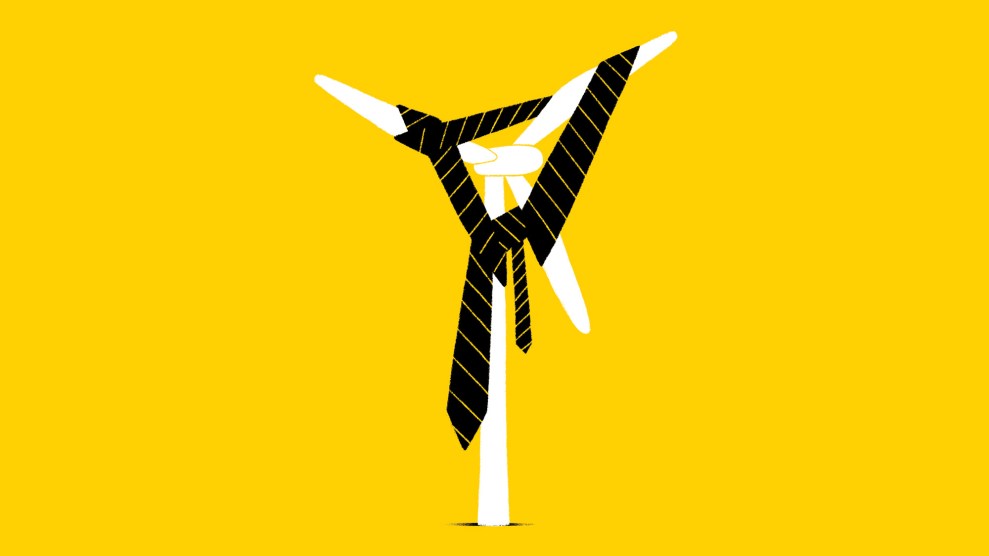
The six Arizona Corporation Commission candidates gather for a debate in Phoenix on September 3.Joe Rondone/Arizona Republic
This story was originally published by Inside Climate News and is reproduced here as part of the Climate Desk collaboration.
Approval of the construction of two gas power plants without public comment. Another’s expansion approved without an environmental review.
New fees for homeowners with rooftop solar that the Arizona attorney general has called “discriminatory” and “unconstitutional.” Approval of an 8 percent rate increase for customers of Arizona’s largest utility, largely to cover the costs of expanding its grid despite the availability of cheaper options. The gutting of the utility’s plan to provide financial support for communities impacted by the closures of coal-fired power plants.
And all of that in just the past year.
Those decisions by the Arizona Corporation Commission (ACC) have drawn an outcry from environmentalists and the state’s attorney general, spawned lawsuits, and prompted public campaigns by climate advocacy groups to hold the commission and Arizona Public Service Co., the state’s largest utility, accountable for continuing to use fossil fuels for electricity generation in Arizona.
In previous years, APS has invested tens of millions of dollars in influencing ACC elections. But this November, the commission’s actions and the responses to them will play a pivotal role in determining who will be elected to the commission, which advocates say has the potential to dictate Arizona’s climate and renewable energy future more than any other vote for office holders in the state.
“When it comes to mitigating climate change…the corporation commission plays a huge role in that,” said Emily Doerfler, a clean energy attorney with Western Resource Advocates who represents the climate-focused nonprofit in Arizona.
Created in 1912 under the state’s constitution, the Arizona Corporation Commission regulates the state’s water and power utilities and determines how much customers can be charged, how much profit utilities can make, and how Arizona’s power grid is built and operated, along with other responsibilities. The state is one of 10 where the commissioners are elected and are separate from the state’s other branches of government, meaning only elections and lawsuits can hold them accountable.
“We are the sunshine capital of the entire country. There is no reason why Arizona should not be running entirely on solar.”
In 2022, Republicans took four of the commission’s five seats, giving them a supermajority. But three seats are up for election this year, setting the stage for a possible shift of the commission’s balance of power in one of Arizona’s most important, but often forgotten government entities.
The election comes on the heels of the ACC approving two more gas-powered plants and yet another summer of record-breaking heat in Phoenix, with over 100 days straight of temperatures exceeding 100 degrees Fahrenheit, resulting in 339 confirmed heat-related deaths and another 336 cases under investigation.
Eight candidates—three Democrats, three Republicans and two Greens—are on the ballot for the three spots. Only one candidate, Republican Lea Marquez Peterson, is running for reelection.
In interviews and debates, Marquez Peterson and her Republican running mates, Rene Lopez and Rachel Walden, have defended the current commission’s approval of rate increases, citing the need to maintain grid stability, which they argue requires a “balanced” energy portfolio, including fossil fuels.
“The reality is, as Arizona continues to grow, whether it’s residential growth or we have this long line of data centers and semiconductor industries that want to come to this state, we need to prepare for that energy demand, and that is why energy reliability needs to be our No. 1 factor,” Marquez Peterson said during a debate on Sept. 3.
The Republican candidates have also downplayed the energy sector’s role in contributing to greenhouse gas emissions and argued that creating a mandate for renewables would raise rates further. About a quarter of the country’s emissions come from electric power, according to data from the EPA.
Democratic candidates Ylenia Aguilar, Jonathan Hill, and Joshua Polacheck have campaigned on allowing the free market to dictate Arizona’s energy sources, which they say would favor solar and other renewable energy sources leading to lower emissions and costs, and they have attacked the current commission for failing to protect Arizonans from rising energy costs and climate change. They say they will stick up for customers when utilities ask to increase rates and work to address climate change by expanding renewables in the state.
“Arizona is not known as an oil and gas capital of the country,” Hill, who is currently a mission planner at Arizona State University’s Mars Space Flight Facility, said during the debate. “We are the sunshine capital of the entire country. There is no reason why Arizona should not be running entirely on solar.”
Polacheck, a former foreign service officer with the US Department of State, said in an interview with Inside Climate News that the commission’s actions aren’t just affecting Arizonans today, but also future generations.
“The commissioners will be constructing the future of our state, and whether that state is going to be livable, whether it’s going to be a state where people can afford to raise their families and whether it’s a place where we can coexist with the environment,” he said.
Just a few years ago, it seemed Arizona was close to setting a path to relying on an electricity mix made up entirely of renewable energy by 2050 thanks to a bipartisan plan from the ACC to reach that goal.
But the plan ultimately unraveled. Since Republicans took four of the commission’s five seats in 2022, they have consistently approved new natural gas plants and are attempting to roll back what standards for renewable electricity still exist, though the state’s largest utilities have implemented their own clean energy goals.
The commission’s decisions have prioritized “making it easier for utilities to continue expanding and investing in fossil fuel infrastructure, which is historically much more profitable for them but much more expensive for ratepayers,” said Keriann Conroy, a research associate for the Energy and Policy Institute, a pro-clean energy watchdog organization. “And of course, has a lot of climate and health and environmental impacts.”
The ACC has “abandoned” its duty to protect Arizonans” in favor of profit, says environmental lawyer Emily Doerfler. “The people of Arizona do not matter to the corporation commission.”
This year, two major actions have dominated the headlines about the commission. The first was a decision approving a rate hike from APS that increased customers’ bills by roughly 8 percent, while also adding a surcharge for rooftop solar customers. That action also allowed utilities to build new power plants without first going through a rate hike case that allows public comment on the plan. The second decision expanded UNS Electric’s natural gas-powered Black Mountain Generating Station without an environmental review, which reversed 50 years of precedent and a vote from the commission’s Line Siting Committee that required the project to undergo such a review.
The first action, climate groups argue, raised costs for customers to subsidize the utility’s continued consumption of fossil fuels despite its own studies finding that maintaining its coal-fired plants is uneconomical and that transitioning to renewables sooner would save it and ratepayers money. The ACC even went so far as to amend APS’s own plan, removing a $100 million fund the utility proposed for communities impacted by the coal-fired power plants eventually shutting down.
The Black Mountain Generating Station decision led to legal action. Western Resource Advocates, the Sierra Club and Arizona Attorney General Kris Mayes, a former corporation commissioner herself, separately filed lawsuits appealing the commission’s decision.
UNS Electric plans to add four new gas-powered plants to its Black Mountain facility at 50 megawatts each, for a total of 200 MW. The utility argued that it was not under the jurisdiction of the commission or subject to an environmental review because each of the plants was under 100 MW.
Arizona law requires a Certificate of Environmental Compatibility for power plants over 100 MW, and opponents of the ACC’s action say the new plants should be considered for their combined power output. The commission’s Line Siting Committee rejected the company’s argument in a 9-2 vote, arguing the commission had jurisdiction as the combined power of the plants at the single facility exceeded 100 MW. But the commissioners sided with the utility.
Doerfler, with Western Resource Advocates, said the ACC decision is just the latest example showing the commission has “abandoned” its constitutional duty to protect Arizonans, especially rural ones, “over and over and over again” to instead prioritize utility profits. “The people of Arizona do not matter to the corporation commission,” Doerfler said.
As essentially the state’s fourth branch of government, the ACC almost exclusively has the power to either end or continue Arizona’s reliance on fossil fuels, she said. That would include decisions like whether to mandate a quicker end to coal-fueled plants like APS’s Four Corners Power Plant.
“That means that the emissions that are coming from this coal plant in the next year are almost directly in the hands of the Arizona Corporation Commission,” Doerfler said.
















